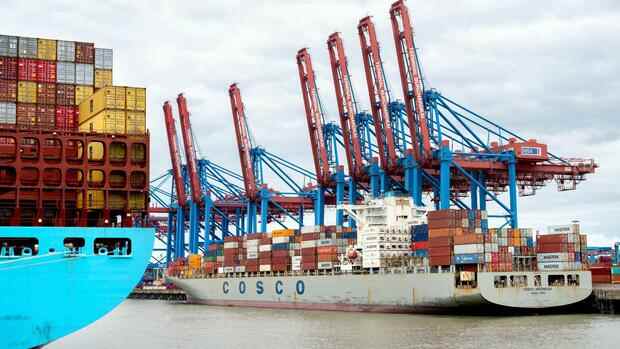The Hanseatic city gives up its resistance to cooperation with Bremen and Wilhelmshaven.
(Photo: picture alliance / Hauke-Christian Dittrich)
Dusseldorf The merger of the port operators in Hamburg, Bremen / Bremerhaven and Wilhelmshaven is apparently about to be decided. “We want to sign a letter of intent this year,” said Angela Titzrath, CEO of the Hamburg terminal operator HHLA, on Thursday at the presentation of the latest quarterly figures. Immediately afterwards, due diligence, the examination of the business books, will begin.
According to Titzrath, it is not the port authorities but only the eight terminals on the German North Sea coast that are to be united under one roof. Whether this will ultimately be a new company or just a cooperation is still open.
Each of the previously competing companies, Titzrath advocated the plan, would bring its own experience and thus accelerate automation and sustainability in the ports. “This will enable us to become number one in Europe,” she enthused. So far, Hamburg has had to be content with third place behind Rotterdam and Antwerp.
The high wages of dock workers on the north German coast, which many critics consider to be anti-competitive, are not to be touched. “We will not question the collective agreements,” said the HHLA boss.
Top jobs of the day
Find the best jobs now and
be notified by email.
So far, the talks have mainly been at the political level, because Hamburg has a majority stake in the listed HHLA, and the city of Bremen has a majority in the Bremer Lagerhausgesellschaft (BLG).
While the senators of the two city-states recently signaled their approval, there was little support from the third shareholder concerned, the Eurokai run by Hamburg entrepreneur Thomas Eckelmann. But she should have a significant say, because together with BLG, Eurokai has an equal share in the Eurogate terminals in Wilhelmshaven, Bremerhaven and Hamburg.
Billionaire Kühne drives merger forward
At the same time, however, the billionaire Klaus Michael Kühne, who lives in Switzerland, is driving the merger behind the scenes. If necessary, they will even be financially supported, the 84-year-old majority shareholder of the world’s largest sea freight forwarder Kuehne + Nagel recently announced. Through its 30 percent stake in the container shipping company Hapag-Lloyd, Kühne is an indirect co-owner of the HHLA terminal in Hamburg-Altenwerder and the loading station in Wilhelmshaven.
Titzrath said that the planned merger has not yet been submitted to the antitrust authorities for approval. The European competition watchdog is likely to be responsible here.
The HHLA boss indirectly admitted that Hamburg, Bremerhaven and Wilhelmshaven could agree on prices after such a merger. At the same time, however, on the customer side, the international shipping lines united in only three alliances, meanwhile a superior force has built up. “The shipping companies are currently using their high profits to buy into terminals, air freight and intermodal land transport,” she said.
The nine-month figures published by HHLA on Wednesday showed how much action is needed in Hamburg. The operating result increased by 51 percent to 162 million euros – but only because containers had to be stored longer due to the ongoing transport congestion and thus at higher port fees.
With an increase in throughput of 1.6 percent, however, the HHLA terminals lost massive market shares compared to the foreign competition. During the same period, the port of Rotterdam increased its container throughput by 7.8 percent, while Antwerp achieved a plus of 3.1 percent.
More: Rival German North Sea ports are fighting the decline – and could merge

